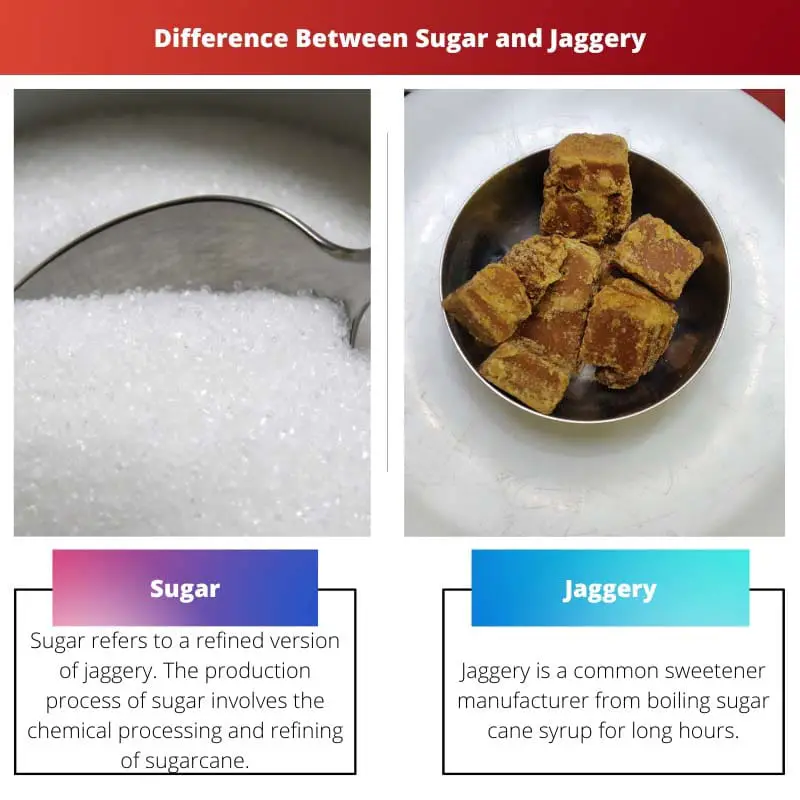When we talk about sweeteners, the most immediate thing that comes to our mind is sugar. However, a widely popular alternative to sugar is jaggery.
Sugar and jaggery are two of the most well-known sweeteners consumed by the general population. While both serve an identical purpose, there are several differences between jaggery and sugar.
Key Takeaways
- Sugar is made by refining sugarcane, while jaggery is made by boiling sugarcane juice.
- Jaggery has a higher nutrient content than sugar, which is less processed.
- Sugar has a higher glycemic index than jaggery, which can cause a more rapid increase in blood sugar levels.
Sugar vs Jaggery
Sugar is made from sugarcane or sugar beets and has a neutral flavor, while jaggery is made by boiling sugarcane juice or palm sap and has a rich, caramel-like flavor. Jaggery is also considered to be healthier than sugar due to its higher mineral content and lower glycemic index.

Sugar refers to a refined version of jaggery. The production process of sugar involves the chemical processing and refining of sugarcane. Sugar has little to no nutrition with it due to the extreme chemical processing it undergoes.
Sugar has a hard texture and is translucent. Over the years, the intake of sugar has reduced among certain communities owing to growing awareness regarding its unhealthy nature.
Jaggery is a common sweetener manufacturer from boiling sugar cane syrup for long hours. It is classified as a more pure form of sweetener and a beneficial alternative to refined sugar.
Since the production process of jaggery involves no chemicals, it retains its nutritions. However, excessive consumption of jaggery can be harmful, especially for diabetic patients.
Comparison Table
| Parameters of Comparison | Sugar | Jaggery |
|---|---|---|
| Color | Sugar is white and translucent. | The color of jaggery may range from dark brown to golden brown. |
| Texture | Sugar has a hard texture. | Jaggery has a semi-solid texture. |
| Treatment | The sugar syrup undergoes a charcoal treatment to give sugar a transparent look. | There is no chemical treatment involved in the production or manufacturing of jaggery. |
| Nutritional Value | Sugar has no nutritional value. | Jaggery is able to retain some of its iron, fiber, and several mineral salts. |
| Health Benefits | Sugar is not ideal for health. | Jaggery has several health benefits because it manages to retain some of its nutrients. |
What is Sugar?
Sugar refers to a sweet-tasting food item consisting of carbohydrates. It is the generic name for sucrose. Sugar provides energy in our diets. This sugar is composed of sugar cane or beets.
Another name for sugar is table sugar or granulated sugar. There are several everyday applications of sugar.
Sugar is used as a sweetener in baked goods, desserts, and sweetened beverages. However, not all refined sugar is vegan. To look for vegan sugar, individuals may consider alternatives like coconut sugar.
There are four common types of white sugar: granulated sugar, superfine sugar, powdered sugar, and sugar cubes.
Furthermore, some famous types of sugar are brown sugar, turbinado sugar, muscovado sugar, and demerara sugar. Sugar is a hygroscopic substance. As a result, it absorbs moisture.
While this is an ideal condition for baking, it may be bad for storing purposes since moisture retained sugar forms clumps. Therefore, sugar should be stored in an airtight container and placed in a cool and dry location.
Over the years, there has been a greater realization regarding the harmful impacts of sugar consumption. Due to the absence of any nutrition, intake of sugar only results in the consumption of unhealthy calories.
Sugar consumption plays no role in digestion or liver detoxification. Instead, it results in obesity or diabetes. Therefore, the consumption of sugar must be avoided at most occasions.

| # | Preview | Product | |
|---|---|---|---|
| 1 |

| 365 by Whole Foods Market, Organic Sugar, 32 Ounce | Check Price on Amazon |
| 2 |

| Domino White Granulated Pure Cane Sugar, 20 Oz Canister (Pack of 3) | Check Price on Amazon |
What is Jaggery?
Jaggery is a sweetener obtained from sugar cane. Popular for its health benefits, jaggery is soon becoming an ideal replacement for sugar. Jaggery is well-known as a superfood sweetener.
The most common continents producing jagger are Asia and Africa. It is one of the most popularly consumed sweets, especially in the Indian subcontinent.
Jaggery is known by different names in different countries. For instance, jaggery is called gur in India, Panela in Colombia, Kokuto in Japan, Tapa Dulce in Costa Rica, and Namtan Tanode in Thailand.
The biggest producer of jaggery in the world is India, accounting for approximately 70% of the total production worldwide.
The manufacturing process of jaggery involves three stages, namely extraction, clarification, and concentration. The extraction involves the pressing of sugar canes to extract the sugar syrup.
The clarification process involves the placement of the syrup in large containers so that sediments settle down in the bottom. Later, the syrup is strained to produce a clear liquid.
Lastly, the concentration process involves the placement of the liquid in large pans wherein it is boiled for hours. Jaggery has several health benefits. It aids digestion and helps in the prevention of anaemia.
In addition, research suggests that jaggery plays a vital role in liver detoxification and assists in improved immune functioning. However, jaggery should not be consumed in excessive amounts.

Main Differences Between Sugar and Jaggery
- While sugar plays no role in helping detoxify the liver, jaggery is considered an ideal choice to detoxify the liver.
- Sugar doesn’t aid in blood purification. On the other hand, jaggery aids in the process of purifying the blood.
- Sugar has higher amounts of calories than jaggery.
- While sugar is refined, jaggery is unrefined.
- Sugar doesn’t help in the digestion of food. On the other hand, research suggests that jaggery can help indigestion.



